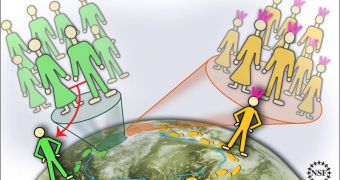Scientists at the University of California in Davis (UCD) have recently just finished drawing conclusions from their latest study, which dealt with explaining the sources of socially learned behavior, as well as self-sacrifice among strangers. In their investigation, the experts determined that people such as firemen, soldiers, blood donors and food-bank donors were influenced more in doing their acts of self-sacrifice by culture, than they were by nature. Details of the results appear in the October 12 issue of the journal Proceedings of the National Academy of Sciences.
Evolutionary social scientists have always been interested in studying altruism, the US National Science Foundation (NSF) announces. From a purely evolutionary standpoint, this type of behavior does not make much sense, particularly because individuals not only risk dying, but they may also be helping others pass on their genes in the process. As a direct result, anthropologists say, this behavior should have not been favored by nature. But, as it stands, it is still here and, moreover, it can be found in other species of animals as well, including some primates and dolphins.
In order to be able to describe how altruism came to evolve, the investigators used a mathematical set of calculations known as the Price equation. Essentially, the calculus compares the genetic and the cultural differentiation that appears and develops between neighboring social groups. They then combined the mathematical aspect of the issue with data collected from the World Values Survey. This poll has a set of questions that is likely to be influenced by the culture of the individual respondents, the team argues. The results were clear: it was culture that drove us to evolutionarily unsound behaviors.
“In applying their results to ancestral populations, the World Values Survey was less useful. But ancient cultural practices, such as exclusion from the marriage market, denial of the fruits of cooperative activities, banishment and execution happen now as they did then. These activities would have exerted strong selection against genes tending toward antisocial behavior, and presumably in favor of genes that predisposed individuals toward being pro-social rather than anti-social. This would result in the gene-culture co-evolution of human pro-social propensities,” the NSF concludes.

 14 DAY TRIAL //
14 DAY TRIAL //